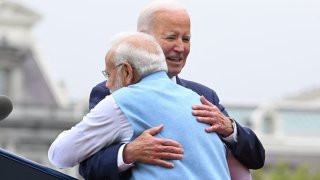
US President Joe Biden hugs India’s Prime Minister Narendra Modi during a welcoming ceremony for Modi, on the South Lawn of the White House in Washington, DC, on June 22, 2023.
- "Every sector of the economy has seen a significant improvement in the manufacturing processes," Union Minister for Railways, Communications, Electronics and Information Technology Ashwini Vaishnaw said.
- The government in its interim budget earmarked 11.11 trillion rupees ($133.9 billion) in capital expenditure for fiscal year 2025, an 11.1% jump from the prior year.
- As many as 61% of the 500 executive-level U.S. managers surveyed by UK market research firm OnePoll said they would pick India over China if both could manufacture the same materials.

India could clock up to 8% annual GDP growth for several years as it focuses on boosting its manufacturing capabilities, a key government minister told CNBC on Thursday.
"Every sector of the economy has seen a significant improvement in the manufacturing processes," Union Minister for Railways, Communications, Electronics and Information Technology Ashwini Vaishnaw said.
Get top local stories in San Diego delivered to you every morning. Sign up for NBC San Diego's News Headlines newsletter.
He highlighted that manufacturing in electronics, pharmaceuticals, chemicals and defense, have all seen great advancements and will tie into Prime Minister Narendra Modi's 'Make in India' initiative that encourages companies to manufacture and assemble goods in the country.
His comments came close on the heels of the government's interim budget that earmarked 11.11 trillion rupees ($133.9 billion) in capital expenditure for fiscal year 2025, an 11.1% jump from the prior year.
India's finance minister Nirmala Sitharaman presented the interim budget on Thursday, which is a stop-gap arrangement before the full budget is tabled by the new government after the general elections later this year.
Money Report
"This budget will reinforce the process of making India which started 10 years back, [and] will lead to significant and consistent 7-8% growth rate for at least next five to seven years" Vaishnaw told CNBC's Sri Jegarajah.
He spoke extensively about the country's mobile manufacturing ecosystem, claiming that 99% of the phones used in India were made within the country.
India is expected to have 1 billion smartphone users by 2026, according to Deloitte.
India, which currently has the world's fifth largest consumer market, is set to move up to the third spot by 2027.
The country exported $11 billion mobile phones last year, and they are likely to rise to between $13 billion and $15 billion in 2024, Vaishnaw said.
Apple's presence in India has grown exponentially since it first started manufacturing in the country in 2017. The company aims to produce 25% of all of its iPhones in the South Asian nation, according to another government minister.
In April, Apple opened two retail stores in Delhi and Mumbai. Samsung announced in the same month that it will set up 15 premium experience stores across India by the end of the year in major cities such as Delhi, Mumbai and Chennai.
"The mobile phone industry has consistently grown and is at a major inflection point now. This inflection point will lead to significantly higher growth in the coming," Vaishnaw said.
The first made-in-India semiconductor chip from Micron is also expected to rollout in December, he added.
Stronger U.S.-India ties
Several analysts have said that India will be the biggest beneficiary of the "China plus one" strategy Western firms are beginning to adopt.
"Global supply chains are gradually shifting their approach from one based on efficiency to one increasingly based on geopolitical risk management. As a result, the alternative strategies of reshoring, friendshoring, and nearshoring have become a hot topic for debate," a BofA client note from January said.
As many as 61% of the 500 executive-level U.S. managers surveyed by UK market research firm OnePoll, that was commissioned by marketplace India Index in December, said they would pick India over China if both countries could manufacture the same materials, while 56% preferred India to serve their supply chain needs within the next five years over China.
This is largely spearheaded by warming ties between U.S. President Joe Biden and India's Modi, with the former's "friendshoring" policy aimed at encouraging U.S. companies to diversify away from China making India an attractive alternative.
"I would like to call it 'trustshoring.' They trust India as a country because it's democratic, it has clear policy structure," Vaishnaw said. "Very large manufacturers would like to actually set up mega electronic manufacturing clusters in our country."
In January, Maruti Suzuki, announced that it would invest $4.2 billion to build a second factory in the country. Vietnamese electric auto maker VinFast also said last month that it aims to spend around $2 billion to set up a factory in India.
— CNBC's Michael Bloom contributed to this report.

